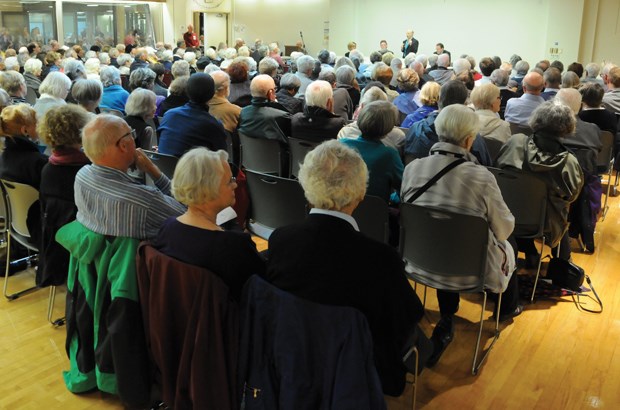It’s one of the biggest of big-ticket items in the federal budget. Health-care costs are high and expected to climb higher as the system faces new demands from an aging population.
The Canada Health Accord, a major 10-year health funding deal between the feds and provinces expired in 2014, leaving a wide-open field for Canada’s four major parties to establish their platforms for a system in stress.
The NDP’s plan is to increase the corporate tax rate for large businesses by two per cent in order to fund more front-line health-care providers. “Three hundred million dollars for 200 clinics… 7,000 doctors and nurses. We’re going to target communities with shortages and we’re going to enable five million more people to access a family doctor, which of course is an ongoing problem,” said Carol Baird Ellan, NDP candidate for Burnaby North-Seymour.
The party also plans to spend $2.6 billion to establish a national pharmacare program, thereby completing the health-care system Tommy Douglas once envisioned. “There are lots of old people and new people who can’t afford their prescriptions and are simply not taking them and that’s just not acceptable,” Baird Ellan said.
The Green Party also supports a national pharmacare plan, which West Vancouver-Sunshine Coast-Sea to Sky Country candidate Ken Melamed said would cost about $300 million per year in the federal budget, but end up saving $11 billion for Canadians.
Also in the Greens’ plans are: Free dental care for low-income youth under the age of 18, which would include about 700,000 Canadians, a $43-million-per-year dementia strategy, putting a new tax on toxic chemicals and providing a guaranteed livable income supplement, because poverty is a key determiner of health, Melamed said. “We shun the approach that has been taken by the Conservative party, which is to tie health-care funding to GDP and basically disregard the premises in the Canada Health Accord.”
West Vancouver’s Liberal candidate Pamela Goldsmith-Jones said the first thing the Liberals will do is get provincial and territorial premiers back to the table with an aim to discussing issues. “It’s been more than a decade since a Canadian prime minister sat down with the provincial and territorial premiers to talk about health care, let alone the challenges. It’s a significant burden to all provincial and territorial governments,” she said.
As for new initiatives, the Liberals are promising to put more of an emphasis on mental health and $3 billion over four years into home care for seniors. “That’s to address the fact that, obviously, living in a hospital is not the best use of resources, nor is it the best way to live,” she said.
The Liberals too have plans to use the federal and provincial governments’ buying power in reducing drug costs, but they stop short of calling it a pharmacare plan.
West Vancouver Conservative candidate John Weston said health funding is not facing any current threat as it stands right now. “Because we have a strong economy, we’ve been able to cover the costs of the $150 billion per year health-care system,” he said. “It’s really misleading for my opponents to promote the expiry of the health-care accord because there’s a solid commitment by the federal government. Six per cent, year after year, right through 2017 and beginning thereafter, a long-term formula with minimum three per cent increases per year that will continue to provide support to the provinces. It’s not expired. It’s not being cut. It’s not even static. It’s projected to increase.”
Weston said future health-care costs can be avoided by keeping Canadians healthy and active, especially as they get older. “That’s where I like to promote our health-care system as opposed to our sick-care system and I support programs and services that promote that,” such as ParticipACTION, the Heart and Stroke Foundation, Public Health Canada, he said.
Steve Morgan, professor in UBC’s population and public health program, said there are four key issues he’d like to see addressed in the parties’ platforms: a strategy to deal with Canada’s aging population, modernizing the health-care delivery system to shift the emphasis off sit-down visits with doctors and onto a more integrative approach involving a team of medical practitioners, and the inclusion of a pharmacare program. “If any party was able to land on all of those points, I think from the perspective of a health policy expert in this country, they would be doing very well,” he said. “The very least you could do from the federal level is agree to meet on a regular basis with the provinces to discuss issues around the health-care system.”



